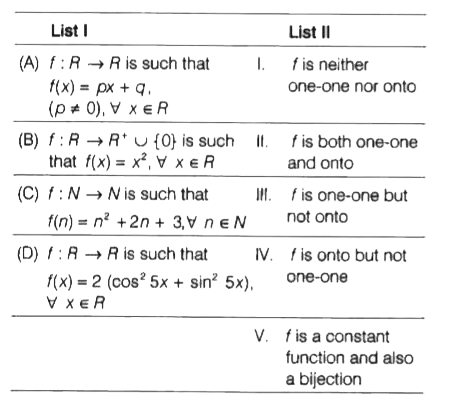If the kth term in the expansion of (32x2−13x)6 is independent of x, then the numerically greatest term in the expansion of (32x2−13x)k when x=23, is Solution in Telugu
4081
(76)5
2027
(76)4
The correct Answer is:C
Step by step video, text & image solution for If the k^(th) term in the expansion of (3/2 x^(2)- (1)/(3x))^(6) is independent of x, then the numerically greatest term in the expansion of (3/2 x^(2)- (1)/(3x))^(k) when x=2/3, is by Maths experts to help you in doubts & scoring excellent marks in Class 12 exams.
Updated on:21/07/2023Topper's Solved these Questions
Similar Questions
If f:R→R,g:R→R are defined by f(x)=5x−3,g(x)=x2+3, then (gof−1)(3)=
View SolutionMatch the following

The correct answer is
View Solutionfind the term independent of x' in the expansion of (1+x+x^(2))((3)/(2)x^(2)-(1)/(3x))^(9)
View SolutionFind the term independent of x in the expansion of (1+x+2x^(3))[(3x^(2)/2)-(1/3x)]^(9)
View SolutionThe middle term in the expansion of (1-3x+3x^(2)-x^(3))^(6) is
View SolutionNumerically the greatest term in the expansion of (2-3x)^(7) when x=1 is
View SolutionFind the term independent of x in the expansion of (32x2−13x).
View SolutionThe term independent of x in the expansion of (1+x+2x3)(3x2/2−1/3x)9 is
View SolutionIf the terms independent of x in the expansion of (32x2−13x)9 is k, then 18 k is equla to
View SolutionThe number of terms in the expansion of (1+3x+3x2+x3)6 is:
View SolutionMiddle term in the expansion of (1+3x+3x2+x3)6 is
View SolutionThe term independent of x in the expansion of (32x2−13x)9 is
View SolutionFind the term independent of x in the expansion of (1+x+2x^3)[(3x^2//2)-(1//3x)]^9
View SolutionFind the term independent of x in the expansion of (1+x+2x^3)[(3x^2//2)-(1//3x)]^9
View SolutionFind the term independent of x in the expansion of (1+x+2x3)(32x2−13x)9
View Solution
